The Black Iron Prison
By:
July 13, 2011
This essay of mine was published in the first issue of n+1 (July 2004). It was conceived of as a review of four books published around that time: Richard Wolin’s The Seduction of Unreason, the Library of America’s new translation of Tocqueville’s Democracy in America, a new edition of Hannah Arendt’s The Origins of Totalitarianism, and a new edition of Philip K. Dick’s The Unteleported Man. However, it turned into something else. Happy Bastille Day (tomorrow)…

In “The Intelligent Coed’s Guide to America,” an essay from his 1976 collection Mauve Gloves & Madmen, Clutter & Vine, Tom Wolfe recounts one of his early rhetorical triumphs over the nay-saying nabobs of the American left. It seems that at a 1965 Princeton conference, he lost it when Günter Grass, Allen Ginsberg, and Paul Krassner started babbling about the specter of fascism in America: “Suddenly I heard myself blurting out over my microphone: ‘My God, what are you talking about? We’re in the middle of a… Happiness Explosion!’” According to Wolfe, ressentiment was the likeliest explanation for the “ghastly delight” intellectuals of the period took in depicting the land of the free as a gilded cage. “The European intellectuals have a real wasteland? Well, we have a psychological wasteland. They have real fascism? Well, we have social fascism,” etc., he ventriloquizes with glee.
But Ginsberg, et al., were just a warm-up exercise for Wolfe, who immediately proceeded to dismiss a more intellectually serious challenge: Herbert Marcuse’s then-influential theory of “repressive tolerance.” The former Frankfurt School theorist had warned of creeping, indirect totalitarianism in the United States. No longer did social domination rest upon authoritarian violence; rather, it depended on the individual’s propensity to identify with and internalize the worldview of those in power. “This was an insidious system,” snorts Wolfe, “through which the government granted meaningless personal freedoms in order to narcotize the pain of class repression, which only socialism could cure. Beautiful! Well-nigh flawless!”

Three decades later, Wolfe was still at it. In the 150th anniversary issue of Harper’s, published not long before 9/11, he berated citizens of the “most powerful, prosperous, and popular nation of all time” for failing to celebrate the imperial glory of America: “an El Dorado where the average working man [had] the political freedom, the personal freedom, the money, and the free time to fulfill his potential in any way he saw fit.” If Marcuse was no longer au courant, Wolfe found another European intellectual kook to mock. These days, he wrote, we were asked to believe that “the powers that be manipulate, with poisonous efficiency, the very language we speak in order to imprison us in an invisible panopticon, to use… Michel Foucault’s term.” Foucault and his ilk were standing in the way of the greatest celebration ever! Just ask those regular folks, who, according to Wolfe’s Harper’s manifesto, voice their opposition to the snarkiness of intellectuals “at night, over cigarettes… muttering, grousing, grousing, muttering… all the while doubting their own common sense,” which tells them there is no cause for alarm whatsoever, that America is really OK.
But in the wake of 9/11, a number of left-leaning intellectuals — particularly, though not exclusively, those who approved of the US military actions in Afghanistan and Iraq — have articulated a similar message of American OK-ness. Much like Wolfe, born-again liberals have repudiated those thinkers who ever dared suggest our country might somehow be, as the poet Heine put it (of America, in 1831), a “monstrous prison of freedom” in which “invisible chains” weigh far more heavily upon unwitting inmates than visible ones ever did.

Richard Wolin’s The Seduction of Unreason is a newly published treatise and tract investigating postmodernism’s debt to proto-fascist ideas and attitudes. Along the way Wolin, a regular contributor to The New Republic and Dissent and the author of a study of Walter Benjamin, takes pains to make scathing remarks about an impressive variety of indirect-domination claims. These include: Marcuse’s diagnosis of a one-dimensional society, T.W. Adorno’s vision of a totally administered world, Foucault’s argument that forces of governmentality have become adept at “inscribing” us in the clutches of power-knowledge, Jacques Derrida’s concerns about the hegemonic force of the dominant discourse, and what Wolin calls Jean Baudrillard’s verdict on the impossibility of progressive historical change.
Wolin rejects all such insidious-system claims not simply because they are “overtly cynical and empirically untenable,” he writes, but because if the workings of power do persist in defiance of even the best-intentioned efforts to disrupt them, then “the emancipatory hopes of the vast majority of men and women seem consigned in advance to frustration and disappointment.” To regard the Enlightenment’s vision of the future with skepticism, cynicism, irony, or contempt is to be left, he says, “dazed and disoriented — morally and politically defenseless.” Wolin’s argument against indirect-domination claims is in effect an inversion of Wolfe’s. Because social inequality and class injustice have at last been overcome, according to Wolfe, we should stop imagining that America is an invisible-prison state. Wolin’s point is that we should stop imagining that America is an invisible-prison state because those same problems have yet to be overcome.
We should always be nervous when ideological enemies agree on anything. Wolin’s book points out how disturbing it is that arguments once the prerogative of the counterrevolutionary right should have attained a new lease on life among the postmodernist left. I propose that glib denunciations of indirect-domination claims tossed off with equal aplomb by reactionaries like Wolfe and progressives like Wolin are just as troubling. In fact, it wasn’t ivory-tower leftists and poststructuralists who dreamed up indirect-domination theory — it was thinkers closer to the ground, outsider intellectuals with bizarre, unclassifiable politics. There exists what some might call a Secret History of Invisible-Prison Theory, one that reached its rhetorical apotheosis so far not in the scholarly writings of Adorno, Marcuse, Foucault, or Baudrillard but in the outré poetry of Baudelaire and the pulp science fiction of Philip K. Dick. This history begins, according to my own research, in the early 19th century.
Between the publication of the first and second volumes of Democracy in America, in 1835 and 1840 respectively, Alexis de Tocqueville’s tone became increasingly foreboding. If in the first volume of the Frenchman’s study of the democratic spirit of the age he’d praised American democracy as the antidote to political tyranny, in the second he warned of a new, subtler form of tyranny emerging from America itself, where intangible but inexorable pressures threatened to force even staunch individualists into a formerly unthinkable conformity.
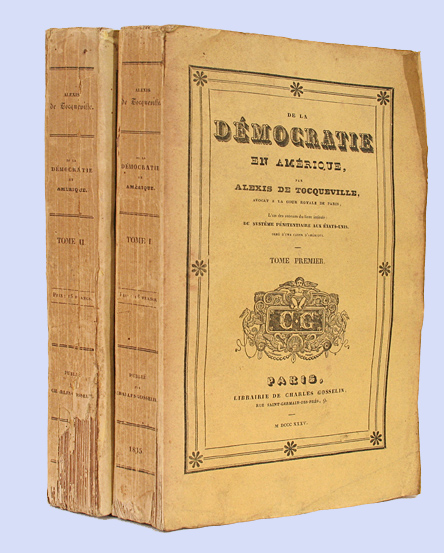
Unlike domination elsewhere, where extra-economic coercion had to be employed to keep citizens in line, it appeared to Tocqueville that the social order of the United States was regulated to a great extent by what he called the American “spirit of gain.” Sure, the new ideals of individualism and equality that were supplanting Europe’s hierarchical and communal values were fostered, just as Adam Smith had predicted, by participation in an open economy. But it was precisely the self-centered individuals of such an economy, hastening to secure their own pleasures regardless of the greater good, who were most likely to surrender their liberty to a paternalistic government, predicted Tocqueville. Much like his contemporary Marx, who scoffed at the bourgeois canard that capitalism was the greatest freedom history would ever know, Tocqueville warned that liberal capitalism might become an insidious form of bondage for worker and capitalist alike.
At times the second volume of Democracy in America reads like a gothic novel of demonic possession — or a Cold War sci-fi novel about the invasion of puppet-master aliens. “In democratic nations, the general public… possesses a singular power, of which no aristocratic nation can even conceive,” Tocqueville intones, in the Library of America’s new translation. “Rather than persuade people of its beliefs, it imposes them, it permeates men’s souls with them through the powerful pressure that the mind of all exerts on the intelligence of each.” Since intellectual authority in a democracy comes neither from outside mankind (God), nor from an elite class, the disposition to believe in public opinion, to accept it without question, increases. If everyone is equally enlightened, then truth should lie with the greatest number, goes the thinking. The end result? A future society in which the opinion of the majority will impel the individual, despite having “smashed all the shackles” of political tyranny, “willingly to cease thinking at all” — that is, to submit to shackles worn not on the limbs but inside the head. In a cryptic footnote reminding us that his own political sympathies were not entirely democratic, Tocqueville suggested that the solution to the either/or of feudalist aristocracy and liberal capitalism might be an “aristocratic republic” in which ordinary citizens experienced a certain political and economic liberty but the unpossessable aristocracy would continue to guide society.
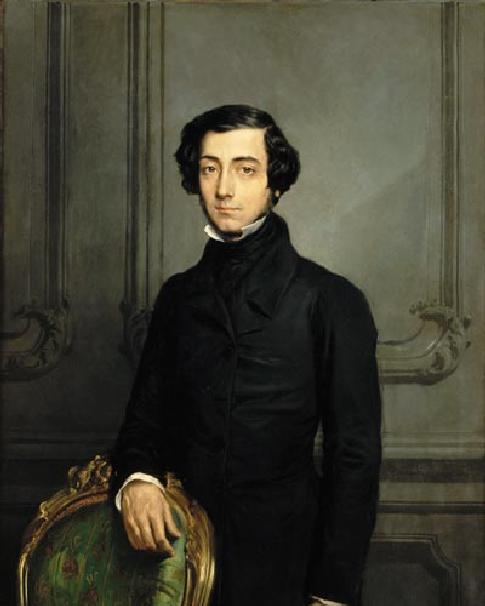
In a concluding chapter, Tocqueville expresses his deepest fear: If democracy and the spirit of capitalism had made it possible to establish a despotism in America “more extensive and more mild” than any in antiquity, he asks, then what was to stop a European ruler from combining authoritarian sovereignty with liberal capitalism and thereby becoming powerful enough to “dictate and manage the lives of each and every one” of his subjects, controlling the minutest details of social life and of individual existence? The terms “despotism” and “tyranny” wouldn’t suffice to describe such oppression, one spreading “a fine mesh of uniform, minute, and complex rules” over society, Tocqueville warns, and every day making “man’s use of his free will rarer and more futile.” He declines to name this emergent social order, which bears a strong resemblance to what the critic Clarke Cooper has termed “neototalitarianism” — which may indeed strive “to organize the infinite plurality and differentiation of human beings as if all of humanity were just one individual,” as Hannah Arendt puts it in The Origins of Totalitarianism (recently reissued), but which employs carrots instead of sticks to do so, without any recourse to loyalty oaths, concentration camps, or the like. Let’s call it an invisible prison.
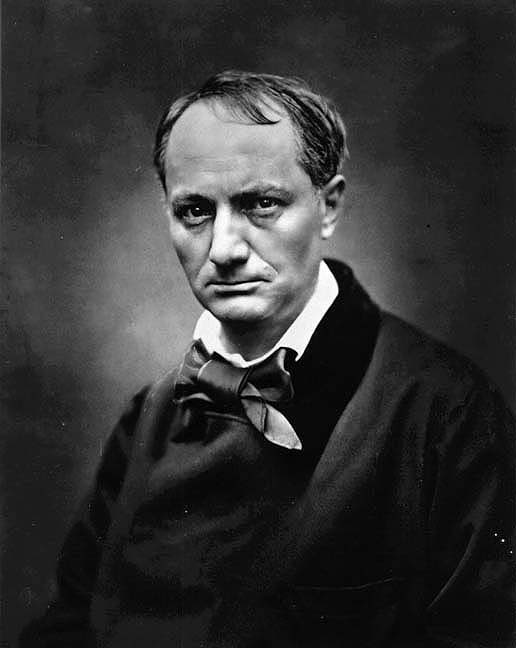
Tocqueville and Heine, along with such victims and critics of the literary marketplace as Edgar Allan Poe and Gérard de Nerval, were merely warm-up acts and inspirations for the artist and thinker I consider the original invisible-prison theorist: Charles Baudelaire. If Foucault is correct to propose that social command in early 19th-century France was no longer simply authoritarian, but had of late begun to operate through a diffuse network (fine mesh) of unspoken rules “normalizing” (permeating men’s souls with) certain customs, habits, and parameters of thought — rules internalized by those incarcerated in “disciplinary institutions” such as prisons, mental hospitals, factories, and universities — then perhaps we might call Baudelaire, who was kicked out of high school while Tocqueville was writing the second volume of Democracy in America, and who never again set foot in a disciplinary institution, Europe’s unnormalized man.
During his own lifetime, Baudelaire was dismissed as an aesthete — an amoral, apolitical, shallowly ironical fop whose collected poems, as one influential reviewer put it at the time, amounted to nothing more than “a strange sort of kiosk, very ornate and artificial but yet elegant and mysterious, where Poe is read, [and] where the intoxicating effects of hashish are sought as a subject of rational analysis, and where opium and a thousand abominable drugs are drunk in precious porcelain cups.” Ever since, those who’ve found his thoroughgoing criticisms of the politics, economics, and culture of liberal capitalism not to their liking have mischaracterized Baudelaire in the same way. Wolin, for example, complains that Foucault offers no recourse to those who “seek to disentangle themselves from power’s omnivorous maw” except to engage in “alternative cultural practices — such as, following the lead of Nietzsche and Baudelaire, the choice of a beautiful life — that might temporarily outwit power’s totalizing grasp.” Without question, he was an aesthete and a fop — but he was more than that. Baudelaire was an engaged ironist, a politicized dandy unable to shake the sensation that the liberalized “bourgeois monarchy” of Louis-Philippe he was to endure until 1848 was, in some insidious fashion, a new mode of tyranny.
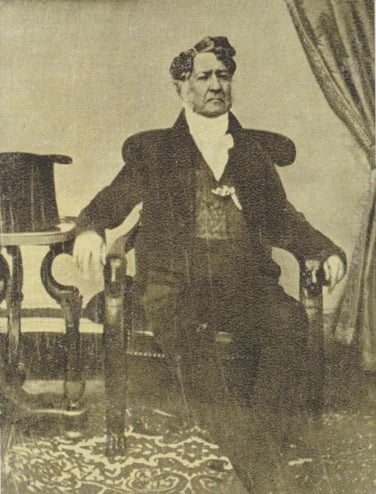
A handful of 20th-century critics cynical about liberalism recognized the impetus behind Baudelaire’s writing, but they were already too far inside the notion of the invisible prison to bring it out as a consistent organizing principle of his work, or to articulate its implications except in the jargon of their own liberatory agendas, Marxist, messianic, or schizo-Deleuzian. But to take Baudelaire neat is to be forever altered. His hysterical overidentification with Poe, who in an obituary he called a martyr for whom “America was nothing more than a vast prison which he traversed with the feverish agitation of a being made to breathe a sweeter air”; his flâneurie and contempt for the “Bostonian” ideal of utility in all affairs; his philosophical writing on the effect of drugs; his idiosyncratic appropriation of Romantic clichés of spleen and ennui; his reasoned, ascetic meta-dandyism; suddenly it all makes sense! In Baudelaire’s lucid, horrified understanding, the laissez-faire capitalism championed by the umbrella-toting Citizen-King and his chief minister Guizot — for whom “Enrichissez-vous” served as a post-ideological solution to every social problem — entailed a soft terror, a bourgeois authoritarianism more ruthless than anything feudalism had dished out: One had to make oneself useful, operational, commensurable, or else disappear. What Tocqueville thought might come to pass in America Baudelaire claimed was already the case in France. Every word he wrote was a protest against this inexorable, totalizing state of affairs.
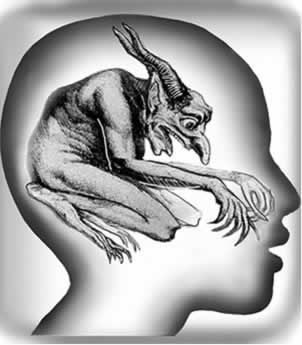
Marx, who was writing his early, philosophical manuscripts in Paris at the very moment Baudelaire was penning his first poems, may have believed the only way humanity could emancipate itself from the seamless machinations of bourgeois capitalism was through the overthrow of the whole system by the one class that had no stake in it, but Baudelaire labored under no such illusion. A neither/nor (or negative-dialectical, to use Adorno’s term) rather than dialectical thinker, he intuited that Enlightenment-style dialectical mediation and reconciliation was less a promise of future revolution than it was the achieved reality of bourgeois society. The genius of the middle classes who’d come to power along with Louis-Philippe, Baudelaire recognized, was their knack for relocating coercion within spontaneity, authority within liberty. His 1862 prose poem “To Each His Chimera,” in which the narrator encounters a line of men shambling nowhere, each obliged to view the world through the eyes (literally) of a puppet-master creature clinging to his shoulders, and each not despairing but “condemned to hope forever,” is an enduring parable about both the ideology of progress and the unlikelihood of anti-capitalist revolution.
Instead of becoming an organic intellectual speaking on behalf of the working classes, then, Baudelaire cast his lot with the déclassés of Paris, those unrevolutionary types whom Marx would dismiss as “decayed roués with dubious means of subsistence and of dubious origin, ruined and adventured offshoots of the bourgeoisie…, vagabonds, discharged soldiers, discharged jailbirds, escaped galley slaves, swindlers, mountebanks, lazzaroni, pickpockets, literati, organ-grinders, rag-pickers… in short, the whole indefinite, disintegrated mass, thrown hither and thither, which the French term la Bohème.” If those who toiled in factories and those who employed them were equally inmates in an invisible prison, Baudelaire preferred to breathe sweeter air among society’s unpossessable losers. (Adorno approvingly interprets Baudelairean décadence as “the reverse image of the false purposefulness of industry.”) But instead of adopting the fake-authentic lifestyle favored by those of his fellow middle-class dropouts given — then, as now — to sporting proletarian garb and shaggy beards, Baudelaire racked up lifelong debts with tailors and bootmakers in order to transform himself into the ultimate antibohemian. Why did he take absurd pains with his appearance? Perhaps it was for the same reason that those who ended up surviving Stalin’s gulags and Hitler’s concentration camps are said to have carefully combed their hair and tied their shoes every day — because that’s what it takes.
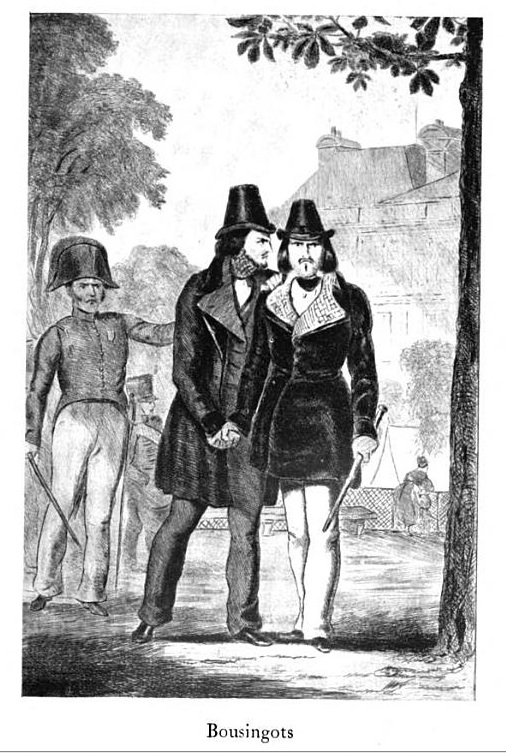
And what of Baudelaire’s artificial paradises? Walter Benjamin once described the Baudelairean hashish eater’s demands on time and space as being “absolutely regal”; borrowing Tocqueville’s term, and recalling Baudelaire’s participation in the 1848 revolution, I might amend “regal” to “aristocratic-republican.” Baudelaire’s ennui (his morbid fascination with ticking clocks and tolling bells), as well as his spleen (the sensation he experienced of being crushed under an overcast sky, or penned in by raindrops forming cell bars), can be understood as a neurasthenic reaction to newly emergent liberal-capitalist despotism. If Baudelaire refused to resign himself to the subjective tyranny of time and space, it was because — as Marcuse, who praises him as an avatar of “the revolt against culture based on toil, domination, and renunciation,” suggests — such resignation is “society’s most natural ally in maintaining law and order, conformity, and the institutions that relegate freedom to a perpetual utopia.” Baudelaire’s flâneurie was street theater performed for the bustling downtown crowd — an advertisement for extase, freedom from clock-time. As for his oddly nonsexual notion of volupté, for Baudelaire the term signified a thrilling escape into tropical spacelessness. Though drugs also offer extase and volupté, Baudelaire claimed they are rarely worth the hangover.
None of the above might appear to indicate that Richard Wolin is wrong about Baudelaire, that the poet offered anything but stratagems by which one might temporarily outwit power’s totalizing grasp. Yet Baudelaire’s writings — and his eccentric espousal of both reactionary and anarchistic politics — have proven unsettling to liberals and conservatives alike. This was particularly the case at the height of the Cold War, when at least one neoconservative ideologue felt compelled repeatedly to castigate the long-dead poet for having almost single-handedly prevented the irrevocable triumph of liberal capitalism.
Written at a time when his own midcentury pronouncement of the End of Ideology no longer seemed self-evident, Daniel Bell’s 1969-70 manuscript “The Cultural Contradictions of Capitalism,” portions of which would be published as individual essays and later collected in a volume of that same title, lamented that Baudelaire’s sensibility “undermines the [middle-class] social structure itself by striking at the motivational and psychic-reward system which has sustained it.”

Although Bell quotes Max Weber’s theory that cultural values can exercise a powerful influence over society’s economic arrangements, he does not remind readers that, according to Weber’s The Protestant Ethic and the Spirit of Capitalism (1904-05), the bureaucratization and rationalization of all aspects of life by the state and its agencies was transforming modern society into an “iron cage.” (Nor does Bell quote a letter written a few years later by a teenage Andre Breton attributing to Baudelaire’s poetry the capacity to “undermine the walls of the real that enclose us” — i.e., the invisible prison.) Although Bell has often described himself as a socialist in economics, at the end of the 1970s he was concerned to refute the pernicious notion that there was any alternative to liberal capitalism. Just months before Ronald Reagan was elected president, Bell complained in an introduction to the paperback edition of The Cultural Contradictions of Capitalism that if cultural modernism is “the agency for the dissolution of the bourgeois world view,” then Baudelaire was the avatar of modernism itself.
Today, America’s motivational and psychic-reward system is once again firing on all cylinders, and Bell’s hand-wringing over “The Sensibility of the Sixties,” as one chapter of his book was titled, seems risible. But the Baudelairean sensibility was taken very seriously indeed in some quarters back then, as we learned recently with the publication of Frances Stonor Saunders’s The Cultural Cold War. Throughout the 1950s and ’60s, it transpires, Bell’s research was funded directly and indirectly by the Congress for Cultural Freedom, a philanthropic outfit later exposed as a front for a CIA operation charged with nudging the Western intelligentsia away from its fascination with alternatives to the American Way. As a young Trotskyite, Bell had studied the means by which the structures of the dominant social order are, in the terminology of Marxian ideology critique, “naturalized,” “historicized,” and “eternalized”; it would have been a cinch, then, for him to assist the CIA in making liberal capitalism appear not merely superior to all other past, present, or future political and economic arrangements, but the natural, historically inevitable, and eternal order of things.

Dwight Macdonald, one of the few New York intellectuals kept in the dark about the Congress for Cultural Freedom, doubtlessly because instead of having become a neoconservative after World War II he remained an oddball anarchist-cum-cultural mandarin, nevertheless instinctively criticized the Congress’s project when he complained, in a 1958 letter to Bell (who in a review had chuckled indulgently over a collection of Macdonald’s political essays), that “I don’t see why a drastic rejection of what is necessarily means pure-heart-but-wooly-wit; in fact, I think I am the one that has tried to think and to analyze quite objectively, and that you… may simply be unwilling to go beyond a certain point in ‘facing up to things,’ that point being the farthest reach of conventionality.” What Macdonald — who in 1966 would quote Baudelaire’s Poe obituary at the funeral of Delmore Schwartz — didn’t appear to realize was that his former comrade was acting as a mouthpiece not for anything so harmless as conventionality but for liberal-capitalist ideology itself. Bell’s indulgent tone echoed the dominant discourse, which always laughs off challenges to what is.
Macdonald, who was in those days sleepwalking through a limbo period between the demise of his antiwar journal politics and his role (along with Ginsberg) as godfather to the Yippies, certainly suspected that America was becoming an invisible prison. His polemics against the peddlers of Masscult and Midcult — borrowing from and complementing, as they did, Adorno’s critique of the culture industry — were motivated not by snobbery but by a conviction that “the tendency of modern industrial society, whether in the USA or the USSR, is to transform the individual into the mass man,” and that totalitarian propagandists had nothing on the Book of the Month Club. But perhaps Macdonald had become too comfortable at The New Yorker and Esquire to do more than carp a little. The Cold War intellectual who picked up where Baudelaire left off was a true outsider: the sci-fi author Philip K. Dick.
He was, he knew, an anankastic, a person for whom reality had shrunk to the dimension of compulsion; everything he did was forced on him — there was for him nothing voluntary, spontaneous or free.” — Philip K. Dick, The Simulucra (1964)

On February 3, 1974, a relatively drug-free Dick suddenly experienced a flood of hallucinatory visions for no apparent reason. This terrifying experience suggested to him that the far-out theories he’d advanced since the 1950s in his politically and epistemologically paranoid stories and pulp novels — which by then amounted to nearly 50 titles, including Solar Lottery, The World Jones Made, Eye in the Sky, The Man Who Japed, Time Out of Joint, Confessions of a Crap Artist, The Man in the High Castle, We Can Build You, Martian Time-Slip, The Game-Players of Titan, The Simulacra, Now Wait for Last Year, The Crack in Space, The Three Stigmata of Palmer Eldritch, The Zap Gun, The Penultimate Truth, The Unteleported Man, Counter-Clock World, The Ganymede Takeover, Do Androids Dream of Electric Sheep?, Ubik, A Maze of Death, Our Friends from Frolix 8, Flow My Tears, The Policeman Said, and A Scanner Darkly — were, in fact, completely and utterly true.
Did the ideas in these books add up to a single, overarching theory? In the remaining eight years of his life Dick devoted thousands of pages of his “Exegesis,” a journal explicating the “2-3-74” epiphany, to answering that question. Like the bewildered characters in his novels, Dick tested out conjecture after conjecture, each one “more cunning, more exciting, and more fucked,” as he put it, than the one before. Although he found none of these ultimately satisfying, there was a common thread. As he would write in the “Exegesis,” on 2-3-74 he was lifted “from the limitations of the space-time matrix,” and instantly recognized that “the world around me was cardboard, a fake” — that it was, in fact, a “Black Iron Prison” (BIP, for short). In that instant, Dick recounts, he felt impelled to take on “in battle, as a champion of all human spirits in thrall, every evil, every Iron Imprisoning Thing.”
A year later, Dick was afforded yet another vision, this time of a “Palm Tree Garden” (PTG), a this-worldly paradise he sometimes described as “that other way of being-in-the-world.” Unlike Foucault — whose Discipline and Punish, written around the time of the events of 2-3-74, likens contemporary society to an inescapable “carceral archipelago” — Dick was convinced that there remains “a good world under the evil.” He claimed: “The evil is somehow superimposed over it.” I’d suggest that readers turn to Dick’s philosophical utterances from the 1970s to learn more, but the “Exegesis” is tiring even to diehard fans, and in interviews from this period Dick drones on in an amphetamine-fueled haze. Instead, let’s take a look at one of Dick’s lesser-known efforts to write against the BIP: The Unteleported Man.
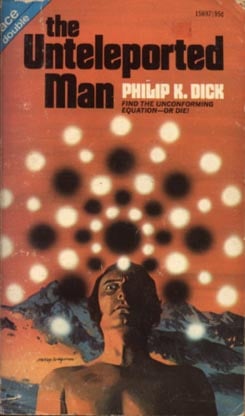
In this book (a 1964 novella in the pulp magazine Fantastic that Dick dusted off in 1979 in order to reissue it as a full-length novel, which was finally published in America only this year), an atomic war between the United States and the Soviet Union has led to UN rule of the planet, renamed Terra. The UN’s Secretary General, German-born Horst Bertold, is a “heavy man, red-haired… . His features were small but his shoulders, his arms and his ribcage, bulged, as if from countless steam baths and handball.” If this reminds you of the new governor of California, don’t worry: Bertold turns out to be one of the good guys.* The villain is Theodoric Ferry, chairman of “one of the most powerful economic syndromes in the Sol system,” a capitalist mogul whose bodyguards are charged with correcting his frequent malapropisms. Noting that Ferry has to be “reminded, constantly, of the most commonplace Terran linguistic patterns,” Freya Holm, an agent with the private police agency Listening Instructional Educational Services (LIES), Inc., speculates that he may be an alien. But whether or not Ferry has been misunderestimated the reader is left to decide.
Lies, Inc. forces us to grapple with the impossibility of ever doing so. We learn, for example, that “subinformation” was beamed into the mind of one Rachmael Ben Applebaum. He is the owner of an outer-space freighter company that went bankrupt when Telpor, a teleportation device, was invented by Ferry’s Berlin-based company and used to transport millions of emigrants to Whale’s Mouth, the universe’s only other inhabitable planet, a Garden of Eden where Terrans can start over. Applebaum wonders why Telpor is a one-way device — why there is no returning from Whale’s Mouth — and suspects there’s something sinister about Ferry’s operation; at the same time, he suspects that these paranoid ideas were inserted in his head. Still, he decides to investigate Ferry’s “economic multi-pseudopodia empire” by traveling across space on an 18-year voyage that will make him the only unteleported man on Whale’s Mouth — even though he knows the solo trip will likely drive him insane. The arrival of the unteleported man, in other words, is like that of the philosopher who descends into Plato’s cave only to invite ridicule from the cave’s prisoners, who are convinced that their world of flickering shadows is in fact the real one.
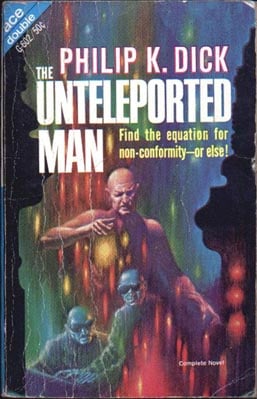
In the end, Whale’s Mouth turns out to be neither a paradise nor, as Applebaum suspected, a Nazi-style death camp, but a “barracks planet” or “garrison state” on the Soviet model. By forcing Terran emigrants to work in factories Ferry is training them to submit to the will of the state; he intends to transport them back to Terra (it’s not a one-way trip after all) and conquer the planet. Thanks to the combined efforts of the UN and Lies, Inc., Terrans learn that the PTG is a BIP: “For one single, limited episode the curtain had been lifted, the people of Terra had received… a picture of the actuality underlying the elaborate, complicated myth.” In the process, Applebaum gets teleported and is shot by Ferry’s troops with an LSD dart; he wakes up in a group-therapy clinic — a Foucauldian disciplinary institution whose patients are required to admit to themselves that there is no barracks planet, that the Black Iron Prison is merely an “alternate distorted subreality.” The UN, meanwhile, attempts to defeat Ferry via a mind-control device of their own: a pulp sci-fi novel about Whale’s Mouth.
Written shortly before Wolfe’s encounter with Grass, Ginsberg, and Krassner, Lies, Inc. — like so many of Dick’s other novels and stories — suggests that what is may not be what it seems, that in a liberal capitalist society freedom and coercion exist in dialectical synthesis, that in a democracy the dominant discourse permeates men’s souls through mass culture and disciplinary institutions alike, and that our only recourse against the invisible prison is to expose its machinations. If Dick expressed crackpot theories like these without fear of reprisal, it’s because — like Baudelaire — he was a loser, a failure, an outsider.
In a 1974 essay titled “Who is an SF Writer?” Dick explains the advantage of working in a despised medium. The science-fiction author “is able to dissolve the normal absolute quality that the objects (our actual environment, our daily routine) have,” he writes. “He has cut us loose enough to put us in a third space, neither the concrete nor the abstract, but something unique, something connected to both and hence relevant… . The daily tyranny of our immediate world, which we generally succumb to, becoming passive in the hands of and accepting as immutable, this is broken, this tyranny of concrete reality.” For “science-fiction author,” read “invisible-prison theorist,” and you’ll understand why — like anarchists and monarchists — they are at once laughable and uncanny to liberals and conservatives alike.

I submit that Baudelaire, Dick, and most other invisible-prison theorists are onto something. Nor am I alone in this opinion. In 1989, Pierre Bourdieu called for writers and intellectuals to act as a “critical countervailing power” to neoliberalism’s “symbolic domination” — i.e., to the invisible prison. Bourdieu suspected that the symbolic end of the Cold War that year would make it all the more difficult for citizens of liberal capitalist societies to shrug off the chimera of progress. “Is the economic world really, as the dominant discourse would have us believe, a pure and perfect order, implacably unfolding the logic of its predictable consequences…?” he demanded in a later essay. “What if it were, in reality, only the implementation of a utopia, neoliberalism… which, with the aid of the economic theory to which it subscribes, manages to see itself as the scientific description of reality?” Life in America under the current administration, whose aim it is to export liberal capitalism and render dissent unthinkable, confirms his fears.
And since 1989? Who during the Happiness Explosion of the 1990s committed career suicide and braved ridicule by voyaging — unpossessable and ridiculous, for what seemed an eternity — far from the disciplinary clutches of alt.culture bohemia and tenure-track transgressiveness? What unteleported souls, pratfalling through the fine mesh of normalizing rules woven about us, are even now keeping the flame of skepticism, cynicism, irony, and contempt burning, despite the risk of winding up on a crypto-McCarthyite snarkwatch list? Who will, in the years to come, protest not merely “Empire” but the subjective tyranny of ennui, spleen, and the space-time matrix itself?
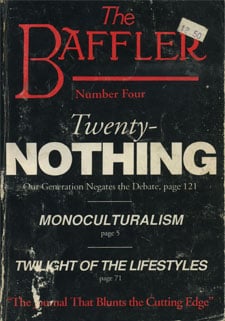
Solo invisible-prison theorists and outsider intellectuals, to be sure — I know they’re out there somewhere. But Dick suggests another, slightly less lonely possibility when, in Lies, Inc., he mentions the existence of a band of kooks whose newsletter warns Terrans to distrust received wisdom and commonsense impressions about the way things are. Aha! From Tocqueville’s opposition newspaper Le Commerce and Baudelaire’s unrealized journal Le Hibou Philosophe to politics and Dissent and even Fantastic to Hermenaut and The Baffler and others, the answer is: independent magazines like this one. Avanti!
* It’s worth recalling that, not long before I wrote this, Senator Orrin Hatch was floating the idea of an “Equal Opportunity to Govern Amendment”; it proposed changing the Constitution to allow those born abroad [i.e., Hatch’s friend Arnold Schwarzenegger, who’d just become California’s governator] to run for president.
MORE FURSHLUGGINER THEORIES BY JOSH GLENN: TAKING THE MICKEY (series) | KLAATU YOU (series intro) | We Are Iron Man! | And We Lived Beneath the Waves | Is It A Chamber Pot? | I’d Like to Force the World to Sing | The Argonaut Folly | The Perfect Flâneur | The Twentieth Day of January | The Dark Side of Scrabble | The YHWH Virus | Boston (Stalker) Rock | The Sweetest Hangover | The Vibe of Dr. Strange | CONVOY YOUR ENTHUSIASM (series intro) | Tyger! Tyger! | Star Wars Semiotics | The Original Stooge | Fake Authenticity | Camp, Kitsch & Cheese | Stallone vs. Eros | The UNCLE Hypothesis | Icon Game | Meet the Semionauts | The Abductive Method | Semionauts at Work | Origin of the Pogo | The Black Iron Prison | Blue Krishma! | Big Mal Lives! | Schmoozitsu | You Down with VCP? | Calvin Peeing Meme | Daniel Clowes: Against Groovy | The Zine Revolution (series) | Best Adventure Novels (series) | Debating in a Vacuum (notes on the Kirk-Spock-McCoy triad) | Pluperfect PDA (series) | Double Exposure (series) | Fitting Shoes (series) | Cthulhuwatch (series) | Shocking Blocking (series) | Quatschwatch (series)
READ MORE essays by Joshua Glenn, originally published in: THE BAFFLER | BOSTON GLOBE IDEAS | BRAINIAC | CABINET | FEED | HERMENAUT | HILOBROW | HILOBROW: GENERATIONS | HILOBROW: RADIUM AGE SCIENCE FICTION | HILOBROW: SHOCKING BLOCKING | THE IDLER | IO9 | N+1 | NEW YORK TIMES BOOK REVIEW | SEMIONAUT | SLATE
